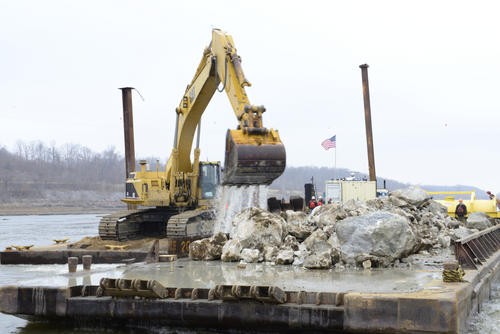Over 700 Barges Stranded by Mississippi River Closure in Memphis Due to Bridge Crack
The U.S. Coast Guard said 44 vessels with a total of 709 barges are now in the queue as a 1-miles stretch of the Mississippi River remains closed after a...

THEBES, Il. – Workers contracted by the Army Corps of Engineers clear rocks from the river floor near Thebes, Il., Dec. 17, 2012. U.S. Coast Guard photo
CHICAGO, Dec 10 (Reuters) – Shipping will be disrupted on a stretch of the Mississippi River as workers remove rocks “over the next few months,” the U.S. Army Corps of Engineers said.
Workers on Tuesday began a project to remove about 2,800 cubic yards of rock from the mid Mississippi River at Thebes, Illinois, the Army Corps said in a statement. The rocks threaten navigation when water levels are low and will be removed during daylight hours.
Shipping is expected to be restricted initially to one-way traffic, with a limit of 15 barges per tow and a no-wake restriction, the Army Corps said. Other restrictions may include “anticipated part-time channel closures,” the statement said.
Barge traffic on the river near Thebes is important for moving grain to export facilities at the Gulf of Mexico from Midwest farms. More than 100 million tons of cargo pass through the mid-Mississippi River annually, including 60 percent of U.S. agricultural exports, according to the Army Corps.
“It’s going to slow things down significantly,” said Debra Colbert, senior vice president for the Waterways Council, an industry group that represents shippers. “There are going to be barges and tugboats waiting in the queue to get through.”
An Army Corps spokesman was not immediately available for comment.
The project continues work the Army Corps began last year, when water levels dropped near record lows from St. Louis south to the confluence of the Mississippi and Ohio rivers because of a historic drought. Last year, the Army Corps removed approximately 1,000 cubic yards of rock in an effort focused on providing adequate depth in the river.
The latest project will focus on providing the width needed for barge traffic to continue when the river narrows as water levels drop.
Despite the disruptions, shippers said they supported the project because it will facilitate river traffic in the event of another severe drought.
“The bottom line is that we really feel it’s in our best interest to get the rocks out of there,” said Ann McCulloch, spokeswoman for the American Waterways Operators. (Reporting by Tom Polansek; editing by Jim Marshall and Cynthia Osterman)
This article contains reporting from Reuters, published under license.

Sign up for gCaptain’s newsletter and never miss an update

Subscribe to gCaptain Daily and stay informed with the latest global maritime and offshore news
Essential news coupled with the finest maritime content sourced from across the globe.
Sign Up